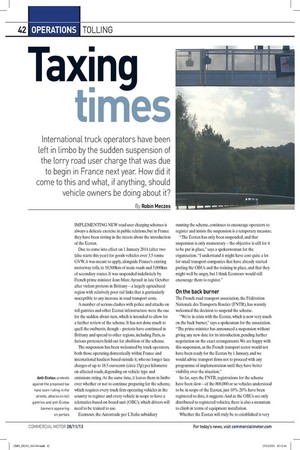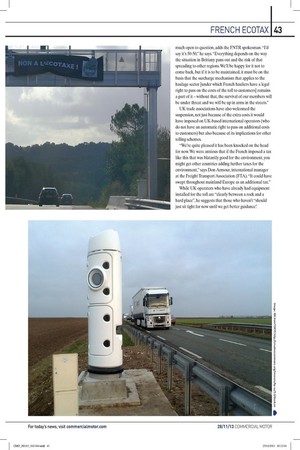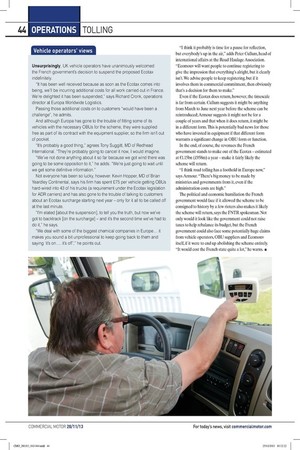Taxing
Page 34

Page 35

Page 36

If you've noticed an error in this article please click here to report it so we can fix it.
International truck operators have been Left in limbo by the sudden suspension of the lorry road user charge that was due to begin in France next year. How did it come to this and what, if anything, should vehicle owners be doing about it? By Robin Meczes
IMPLEMENTING NEW road user charging schemes is always a delicate exercise in public relations, but in France they have been rioting in the streets about the introduction of the Ecotax.
Due to come into effect on 1 January 2014 (after two false starts this year) for goods vehicles over 3.5-tonne GVVV, it was meant to apply, alongside France's existing motorway tolls, to 10,500km of main roads and 5,000km of secondary routes. It was suspended indefinitely by French prime minister Jean-Marc Ayrault in late October after violent protests in Brittany — a largely agricultural region with relatively poor rail links that is particularly susceptible to any increase in road transport costs.
A number of serious clashes with police and attacks on toll gantries and other Ecotax infrastructure were the cue for the sudden about-turn, which is intended to allow for a further review of the scheme. It has not done much to quell the outbursts, though — protests have continued in Brittany and spread to other regions, including Paris, as furious protesters hold out for abolition of the scheme.
The suspension has been welcomed by truck operators, both those operating domestically within France and international hauliers based outside it, who no longer face charges of up to 18.5 eurocents (circa 15p) per kilometre on affected roads, depending on vehicle type and emissions rating. At the same time, it leaves them in limbo over whether or not to continue preparing for the scheme, which requires every truck firm operating vehicles in the country to register and every vehicle in scope to have a telematics-based on-board unit (OBU), which drivers will need to be trained to use. Ecomouv, the Autostrade per L'Italia subsidiary
running the scheme, continues to encourage operators to register and insists the suspension is a temporary measure.
"The Ecotax has only been suspended, and that suspension is only momentary — the objective is still for it to be put in place," says a spokeswoman for the organisation. "I understand it might have cost quite a lot for small transport companies that have already started putting the OBUs and the training in place, and that they might well be angry, but I think Ecomouv would still encourage them to register." On the back burner
The French road transport association, the Federation Nationale des Transports Routier (FNTR), has warmly welcomed the decision to suspend the scheme.
"We're in crisis with the Ecotax, which is now very much on the back burner," says a spokesman for the association. "The prime minister has announced a suspension without giving any new date for its introduction, pending further negotiation on the exact arrangements. We are happy with this suspension, as the French transport sector would not have been ready for the Ecotax by 1 January, and we would advise transport firms not to proceed with any programme of implementation until they have better visibility over the situation."
So far, says the FNTR, registrations for the scheme have been slow — of the 800,000 or so vehicles understood to be in scope of the Ecotax, just 10%-20% have been registered to date, it suggests. And as the OBUs are only distributed to registered vehicles, there is also a mountain to climb in terms of equipment installation. Whether the Ecotax will truly be re-established is very
much open to question, adds the FNTR spokesman. "I'd say it's 50-50," he says. "Everything depends on the way the situation in Brittany pans out and the risk of that spreading to other regions. We'll be happy for it not to come back, but if it is to be maintained, it must be on the basis that the surcharge mechanism that applies to the haulage sector [under which French hauliers have a legal right to pass on the costs of the toll to customers] remains a part of it — without that, the survival of our members will be under threat and we will be up in arms in the streets."
UK trade associations have also welcomed the suspension, not just because of the extra costs it would have imposed on UK-based international operators (who do not have an automatic right to pass on additional costs to customers) but also because of its implications for other tolling schemes.
"We're quite pleased it has been knocked on the head for now. We were anxious that if the French imposed a tax like this that was blatantly good for the environment, you might get other countries adding further taxes for the environment," says Don Armour, international manager at the Freight Transport Association (FTA). "It could have swept throughout mainland Europe as an additional tax." While UK operators who have already had equipment installed for the toll are "clearly between a rock and a hard place", he suggests that those who haven't "should just sit tight for now until we get better guidance':
"I think it probably is time for a pause for reflection, but everybody's up in the air," adds Peter Cullum, head of international affairs at the Road Haulage Association. "Ecomouv will want people to continue registering to give the impression that everything's alright, but it clearly isn't. We advise people to keep registering, but if it involves them in commercial commitment, then obviously that's a decision for them to make."
Even if the Ecotax does return, however, the timescale is far from certain. Cullum suggests it might be anything from March to June next year before the scheme can be reintroduced; Armour suggests it might not be for a couple of years and that when it does return, it might be in a different form. This is potentially bad news for those who have invested in equipment if that different form warrants a significant change in OBU form or function.
In the end, of course, the revenues the French government stands to make out of the Ecotax — estimated at €1.15bn (£958m) a year — make it fairly likely the scheme will return.
"I think road tolling has a foothold in Europe now," says Armour. "There's big money to be made by ministries and governments from it, even if the administration costs are high." The political and economic humiliation the French government would face if it allowed the scheme to be consigned to history by a few rioters also makes it likely the scheme will return, says the FNTR spokesman. Not only would it look like the government could not raise taxes to help rebalance its budget, but the French government could also face some potentially huge claims from vehicle operators, OBU suppliers and Ecomouv itself, if it were to end up abolishing the scheme entirely. "It would cost the French state quite a lot," he warns. •
Vehicle operators' views
Unsurprisingly, UK vehicle operators have unanimously welcomed the French government's decision to suspend the proposed Ecotax indefinitely.
"It has been well received because as soon as the Ecotax comes into being, we'll be incurring additional costs for all work carried out in France. We're delighted it has been suspended," says Richard Cronk, operations director at Europa Worldwide Logistics.
Passing those additional costs on to customers "would have been a challenge", he admits.
And although Europa has gone to the trouble of fitting some of its vehicles with the necessary OBUs for the scheme, they were supplied free as part of its contract with the equipment supplier, so the firm isn't out of pocket.
"It's probably a good thing," agrees Tony Suggitt, MD of Redhead International. "They're probably going to cancel it now, I would imagine.
"We've not done anything about it so far because we got wind there was going to be some opposition to it," he adds. "We're just going to wait until we get some definitive information."
Not everyone has been so lucky, however. Kevin Hopper, MD of Brian Yeardley Continental, says his firm has spent £75 per vehicle getting OBUs hard-wired into 43 of his trucks (a requirement under the Ecotax legislation for ADR carriers) and has also gone to the trouble of talking to customers about an Ecotax surcharge starting next year — only for it all to be called off at the last minute.
"I'm elated [about the suspension], to tell you the truth, but now we've got to backtrack [on the surcharge] — and it's the second time we've had to do it," he says.
"We deal with some of the biggest chemical companies in Europe... it makes you sound a bit unprofessional to keep going back to them and saying 'it's on.... it's off'," he points out.







































